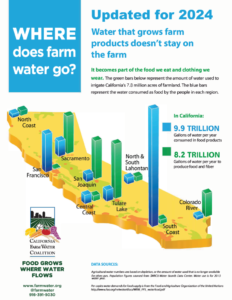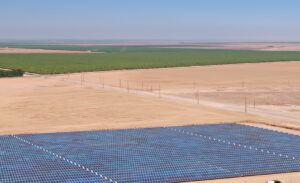From News Line, a daily compilation of farm water news distributed to CFWC members and others upon request. To receive News Line, click here.
Fish Wrap: Salmon fishing outside the bay continues to run hot
Coalition response…Millions of acre-feet of water have been taken from agriculture to benefit fish since the passage of the Central Valley Project Improvement Act by Congress. Despite 20 years of water supply cuts intended to help fish, salmon numbers have continued to fluctuate through the years, meaning that dedicating more water to fish has not resulted in higher numbers.
Scientists from the Pacific Fisheries Management Council and the National Marine Fisheries Service have identified poor ocean conditions—warm temperatures and reduced food supply—as the leading cause of the drop in salmon numbers.
In February 2008 a NMFS report (http://swfsc.noaa.gov/publications/FED/00994.pdf) concluded that the overall cause of the recent salmon decline was ocean conditions. A year later the Pacific Fisheries Management Council reported that all the evidence they could find pointed to ocean conditions as being the proximate cause of the poor performance of the 2004 and 2005 broods of Sacramento River Fall Chinook — http://www.pcouncil.org/bb/2009/0409/H2b_WGR_0409.pdf.
Since the adoption of CVPIA, studies conducted by the California Department of Fish & Game and UC Davis have also shown a strong increasing trend in the abundance of warm water predatory fish in the Delta that feed on juvenile salmon as they make their way through the Delta. The result is predator species consuming and replacing native fish in the Delta — https://farmwater.org/centrarchids.pdf . The article doesn’t mention it but that’s the real reason salmon smolts are trucked around the Delta.
In contrast, public water agencies are translating science into action by supporting, developing and/or implementing solutions that address the need for multi-solution approaches, such as those found in the Bay Delta Conservation Plan. Those solutions will increase both the quality and quantity of habitat diversity through ecosystem based management, as will solutions recommended by a range of science interests from Pacific Fisheries Management Council to the Public Policy Institute of California.
Environmentalists and fishermen have the opportunity to be part of the solution but it will take a concerted effort to move beyond the old approach of simply blaming the pumps.



